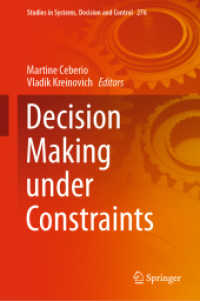- ホーム
- > 洋書
- > 英文書
- > Science / Mathematics
Full Description
This companion provides an overview of a rich field of scholarship and practice, covering key debates around the purpose and value of comparison as a way of generating knowledge and theory. It features examples of comparative studies which explore contemporary issues in planning for sustainable urban and territorial development.
Across seven parts, the book explores questions of 'why' engage in international comparative planning research; 'what' planning aspects might be compared; and 'how' comparison might be approached. Through compelling cases of contemporary comparative research on diverse planning topics, including planning systems and governance, planning instruments and law, urban morphology, planning for risk, perspectives on informality, comparative pedagogy, and more, readers will gain a wide appreciation of comparative studies and the current state of the field. The book comprises 37 chapters by 61 contributors from around the world, offering their vital insights into the vibrant and evolving scholarship.
The companion will be of interest to educators, academics and researchers, planning practitioners, city and municipal governments, consultants, and advanced students in the fields of city, urban, and regional planning, urban design, human geography, and urban, environmental, and international development studies, interested in comparing and co-learning from global practices and places.
Contents
Part I: Background to International Comparative Planning 1. Introduction 2. A History of International Comparison: Theory, Methods and Practice 3. What Is Published as International Comparative Planning Research in Academic Journals? Part II: Why Compare? The Aims and Objectives of International Comparison for Planning and Urban Policy 4. Modes of Inter-Urban Comparisons and Theory Building 5. Beyond (and Between) the Global City? Exploring a Framework to Strengthen Policy Mobility Between Differing Urban Scales 6. Knowledge Co-Production Through International Comparison: Transnational Territorial Knowledge Communities in Action 7. Spatial Planning Outcome Assessment in International Comparison 8. Limits on the International Mobility of Planning Ideas and Practices: Some Historical Lessons 9. Decoloniality of International Comparative Planning Research 10. Benchmarking Responses to Urban Shrinkage: Balancing Normative Dimensions in the Planning Concept of "Shrinking Smart" Part III: What to Compare? 11. Comparative Urban Planning Law: Theories, Methodologies, and Challenges 12. Planning Systems Compared - A Reflection on the State of Art 13. Comparing Planning Policy Instruments 14. Planning Culture 15. "Governance Approaches" to Study Planning Systems 16. Where Is Design in Planning Education? An International Comparison of Planning Programmes in England, Italy and Portugal Part IV: Comparative International Planning Research 17. How to Make Peace with Informality: Deconstructing The Black Box Of Spatial Informality In Land Use 18. The Right to the City: Worldwide Concept and a Brazilian Perspective 19. Rural Development Planning in Europe: The Challenges and Results of a Comparative Approach 20. Resilience and Risk Mitigation: Making the Case for Working Across Silos and Cross-Case Learning 21. Neighbourhood Models for Public Health: A Comparative Retrospective Over the Last Century 22. Comparative Studies in Cultural Heritage and Urban Conservation: Integration in the British and German Planning Systems 23. International Comparative Transport Planning Studies 24. Transit Oriented Development: Improving Urban Sustainability 25. Digitalisation, Urban Data and the 15-Minute City 26. Comparing the Adoption of Digital Data and Technologies in Planning 27. Urban Form and Urban Morphology: Professional and Academic Approaches 28. Comparative International Studies on Public Spaces: Benefits and Limitations Part V: Informing Global Agendas and Professional Practice Through Comparison 29. International Planning Guidelines and Diffusion to Local Planning 30. Liveability and Its Implications in Comparative Spatial Planning 31. International Comparison of Experiences and Knowledge Exchange in Metropolitan and Regional Networks: A View from Stuttgart Region (Germany) 32. International Collaborative Planning Through Private Consultancy Part VI: Education in and for Comparative International Planning 33. Teaching International Comparative Planning in a Globalised Higher Education Context: Pedagogical Imperative and Challenges 34. Developing Comparative Competencies: The International Planning Studio 35. Developing Comparative Study Competencies Through Lived Experiences: Semester Abroad 36. Global Planning Education and Online Pedagogy: An Inquiry into Implementation Part VII: Conclusions and Future Developments 37. International Comparative Planning: Key Findings and Future Agendas







